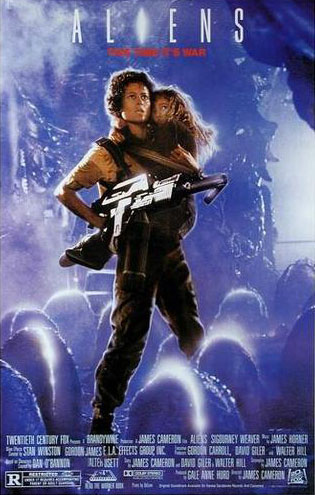
It is possible, however unlikely, that I could shuffle a deck of cards, lay them face down on a table and, in dealing to you the top five, deliver a royal flush. If I dealt to 649,740 people, the odds are good that at least one of them would get poker’s strongest hand, but to the one who actually got it, it would seem almost miraculous, more than he deserved. The cinematic equivalent of a royal flush is what the Alien trilogy received as first a young Ridley Scott, then a young James Cameron, and finally a young David Fincher were chosen to direct its films (some are occasionally moved to insist that there were four Alien movies. I must ask the good reader to accept my assurance that there was no fourth film; any lingering memories of such a thing are probably due to a bad dream).
By all rights, Aliens should have been unremarkable. Following a classic with a classic is next to impossible. Francis Ford Coppola did it, but he followed his own work and brought his same style and vision back to the tale. Aliens would be directed by a Canadian — a near-American! — who was going off a British film that had revolutionized a genre. Although the first installment left unanswered questions, it was not fashioned in such a way that a sequel naturally sprang from its story. For more on what such a situation is likely to produce, the reader may watch the sequels to Psycho and Jaws. If he wishes to explore the top end of the Bell Curve of this particular demographic, he should check out 2010 (The Empire Strikes Back might conceivably be added, but Lucas was still intimately involved with that project and, at any rate, in this reviewer’s humble yet obdurate opinion, Episode V is decidedly inferior to Episode IV).
Aliens is not merely at the top of the Bell Curve of sequels to classics directed by different directors; it is an outlier, soaring many standard deviations above the rest. Though no one could know it then, it had been dealt a royal flush and in 1986 it was time to play its Cameron card (given Cameron’s reputed directing style, this would probably be the Ace of Clubs). What came next was a very different tale, as full of adrenaline as the original was of subdued horror, as American as the first was British, but fully as sublime as its progenitor.
Despite the difference in style — and indeed in subgenre — there are some qualities, pillars of good storytelling, that both works share. They take sufficient time to develop things, leaving the tale mercifully free of that rushed feeling from which so many movies suffer and which leaves the same hollow feeling of dissatisfaction, when the flick is over, that one gets from coitus without foreplay. Both movies are judicious in what they show and when they show it, prolonging tension into delightful agony. The characters feel like real people, their attributes subtler in the opening saga and more salient — in true American fashion — in the sequel, but believable in both cases.
However, the two films approached their thrills very differently. One must be careful not to shortchange Ridley Scott’s Magnum Opus, but notwithstanding a couple inspired plot twists, it survives on atmosphere and setting with a basically simple story, ingenious though the core idea was. Aliens, on the other hand, is a marvel of plotting. There is such a wealth of twists and turns, of character interactions, of dramatic crescendos, of memorable and unique scenes, of obstacles laid in the path of the protagonists… in short, such a wealth of story packed into two and a half hours, without seeming rushed, that it is hard to imagine a cinema-goer so stoic as to be able to view it without having some sort of emotional climax before the credits roll. And like Alien, James Cameron’s piece hits us with some of its best stuff just when we think we’ve reached the end.

As fine a storyteller as Cameron is, and as lustrous a gem as Aliens turned out to be, I have never known a more talented director in such need of an editor as is Cameron. Those who have seen the director’s cut of The Abyss and Terminator II are aware of the clunky parts that, at least in the case of The Abyss, Cameron very much intended to be in the theatrical release. Aliens‘ director’s cut suffers no less from this malady. Though some of the extra scenes are effective, as a whole it is obvious why the editor discarded them, and the film is diminished when they are slipped back in. Nevertheless, no one has yet forced the director’s cut version on me, so I am free to revel in the theatrical version, and it is this that I praise. However much a movie is dominated by its director — and James Cameron is indeed a dominating director — it is still a work of collaboration, to be judged by the final product. When the editor received the result of so much toil, he shaved off the rough and was left with a diamond.
A quick word might be spared on the libertarian angle. Aliens continues the theme of the malfeasant corporation putting money ahead of people, however this time we get small suggestions that a State is there to protect, and that whatever malignant acts the corporation commits it does in contravention of the beneficent if ineffectual regulations of the government (for instance, one of the corporate managers attempts to smuggle an alien past government quarantine, rather than bribe the right officials to get it to his bio weapons division as would most likely be the case). After Hiroshima, Nagasaki, the Khmer Rouge, The Holocaust, the firebombing of Dresden and countless other atrocities, one would think such blatant poppycock were unthinkable. Such devotion to the State coupled with enmity for corporations is like relying on a child molester to keep one’s children safe from the neighborhood bully.
However, a libertarian cinephile must learn to accept such nonsense or look for a new passion. For those who can get past the hackneyed portrayal of the unholy government-business alliance, Aliens offers thrills that few other films have ever equaled.
















Comments on this entry are closed.
Geoffrey Allan Plauché March 20, 2011 @ 6:16 pm | Link
Matthew wrote:
Are you claiming the third Alien film was good!?!
Matthew Alexander March 21, 2011 @ 12:53 am | Link
I thought it was solid but nowhere near the first two. However, given the difficulties the production went through – like not having a finished script – only a director of David Fincher’s caliber could have gotten much out of it.